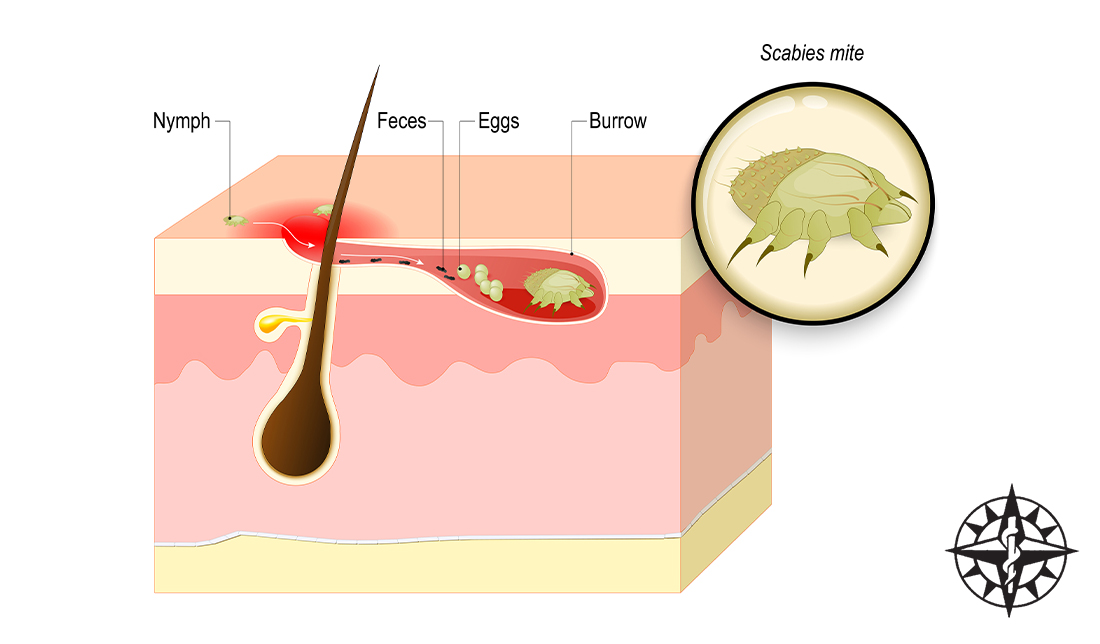Published on: August 21, 2023
The Vital Facts Every Floridian Should Know
Unveiling the Creepy Crawlies: Human Scabies and Skin Mites in Florida
As a resident of the Sunshine State, you’re undoubtedly familiar with the vast biodiversity that Florida showcases, from its lush tropical forests to its sandy beaches. However, this biological diversity does not come without its own array of microscopic trespassers. Today, we’re highlighting two such minute organisms that have been overstepping their boundaries in human society for far too long: human scabies and skin mites.
Scabies & Skin Mites: A Brief Stroll Down History
Scabies and skin mites are not a modern problem. In fact, they’ve been bugging humanity for centuries. References to these parasites date back to biblical times, and in ancient Greece. Hippocrates, the father of medicine, is known to have described the condition. In more recent history, during World War II, scabies infestations were a significant issue in crowded military barracks and hospitals.
Scabies is caused by an infestation of the skin by the human itch mite (Sarcoptes scabiei var. hominis), a microscopic eight-legged creature. As the CDC explains, “These mites burrow into the upper layer of the skin where they live and lay eggs.” On the other hand, other species of skin mites, such as Demodex, typically reside harmlessly on our skin, but they can cause problems in people with weakened immune systems or in large numbers.
Recognizing the Enemy: Signs of Scabies and Skin Mite Infections
Understanding the signs of scabies and skin mite infections is critical for prompt treatment and limiting spread. According to the CDC, “The most common symptoms of scabies are intense itching (especially at night) and a pimple-like rash. The itching is often worse at night and after a hot bath or shower.” Additionally, the Mayo Clinic confirms that the rash may affect much of the body or be limited to common sites such as between the fingers, the wrists, the elbows, the armpits, the waist, and the genital area.
Below is a list of the primary signs and symptoms of scabies:
- Intense itching, especially at night: This itching is one of the primary symptoms of scabies and can become increasingly severe over time.
- Skin rash: Scabies often causes a pimple-like rash that may look like small blisters or knots under the skin.
- Sores: Sores can occur because of scratching the itchy areas. These sores can sometimes become infected.
- Thin, irregular burrow tracks: These are made up of tiny blisters or bumps on your skin. They are typically found in folds of your skin and are a key sign of scabies.
- Specific areas of the body are affected: The burrows or tracks typically appear in the folds of skin between fingers, around the wrist, on the elbows, around the waistline, on the buttocks, around the nipples, soles of the feet, on the knees, and in the genital area.
- Symptoms worsen after a hot bath or shower: Heat can intensify the itching associated with scabies.
- Signs of infection: If the affected area becomes red, warm, tender, or produces pus, then it could be a sign of a secondary bacterial infection, which requires medical attention.
Skin mite infections, or demodicosis, are often less noticeable. They may cause mild itching and redness, but many people have no symptoms. In severe cases, particularly in people with weakened immune systems, the mites can cause a condition known as demodectic mange, leading to flaky skin and patchy hair loss.
The Battle Plan: Treatment Options
If you suspect a scabies or skin mite infestation, it’s crucial to seek medical attention promptly. As Dr. Pritt from the Mayo Clinic affirms, “Treatments for these conditions are safe and effective when administered correctly, but they require a prescription. Over-the-counter treatments are not recommended for scabies.”
For scabies, your healthcare provider may prescribe medications such as permethrin cream, lindane lotion, or ivermectin. These medications kill the scabies mites and their eggs. You typically apply these creams all over your body, from your neck down, and leave them on for at least eight to 10 hours. Your doctor may also prescribe antihistamines, steroid creams, or other treatments to help with the itching.
Skin mite infections are usually treated with creams or lotions that kill the mites. In more severe cases, your doctor may prescribe oral medications.
Education is Empowerment: Preventing Scabies and Skin Mite Infections in Florida
Preventing these microscopic invaders from taking up residence on your skin primarily involves maintaining good personal hygiene and avoiding close contact with infected individuals. The CDC urges Floridians to, “Regularly wash and dry your clothes and bedding. If you’ve been in close contact with someone who has scabies, seek medical advice, even if you don’t have symptoms, as these can take up to six weeks to appear.”
Though scabies and skin mites can affect anyone, certain groups are more at risk. In Florida, the elderly, people with compromised immune systems, and those living or working in crowded conditions (like nursing homes or daycares) should be especially cautious.
Don’t panic if you or a loved one contracts scabies or a skin mite infection. It’s not a sign of poor hygiene, just an unfortunate encounter with these tenacious parasites. With the right knowledge and medical treatment, scabies and skin mite infections can be promptly dealt with.
As Floridians, our richness of life extends to all elements of our ecosystem – from the graceful dolphins to the microscopic mites. Being aware of these tiny stowaways, their signs, treatment options, and preventative measures empowers us to better coexist with the diverse life forms sharing our beautiful state. In this battle of human versus mite, with the right information, humans emerge victorious every time.
Wrapping Up: Winning the War with Knowledge
In our journey through the microscopic world of human scabies and skin mites, we’ve seen their deep historical roots, their tell-tale signs, effective treatments, and the vital steps needed for prevention. As with many battles, knowledge and awareness are the first lines of defense in our war against these minuscule menaces.
It’s crucial to remember that having scabies or skin mite infections is not a reflection of one’s cleanliness or lifestyle, but merely an outcome of encountering these tiny creatures that have been a part of human history for centuries. Floridians, like anyone else, can fall prey to these parasites, but we also have the tools to protect ourselves and recover swiftly.
Early detection can significantly reduce the discomfort and potential spread of these infestations. So, do not hesitate to consult a healthcare provider if you notice symptoms associated with these conditions. Remember, these infestations are treatable and manageable with timely and appropriate medical intervention.
Finally, sharing this information with your community plays a significant role in preventing widespread outbreaks. Consider this article a torch in the dark world of scabies and skin mites. By passing the light of knowledge onto others, you are doing your part in ensuring the well-being of not just yourself, but also your fellow Floridians.
In our shared Florida home, amidst our lush landscapes and vibrant ecosystems, we live with many organisms, big and small. Understanding and respecting this interconnected web of life – right down to the tiniest mites – is what makes us true custodians of our natural heritage. Stay informed, stay vigilant, and stay healthy in our wonderful Sunshine State.
About Infectious Disease Associates of Tampa Bay (IDATB)
IDATB is dedicated to providing exceptional healthcare services to individuals throughout the Tampa Bay region. With a rich history spanning over three decades, we have been serving the community by offering specialized care for infectious diseases. Our comprehensive approach is enhanced by the presence of an on-site laboratory, ensuring prompt and accurate testing.
If you have any questions or concerns related to scabies or any other infectious cases or conditions, don’t hesitate to reach out to us at 813-251-8444. Our team of highly trained healthcare professionals is committed to delivering personalized care and sharing the knowledge you need to make informed decisions about your health.
We understand that in certain situations, visiting our office in person may not be feasible. That’s why we offer virtual appointments and a convenient Telehealth system, allowing you to receive the care you need from the comfort of your own home. Rest assured; we are here to support you throughout your healthcare journey.





